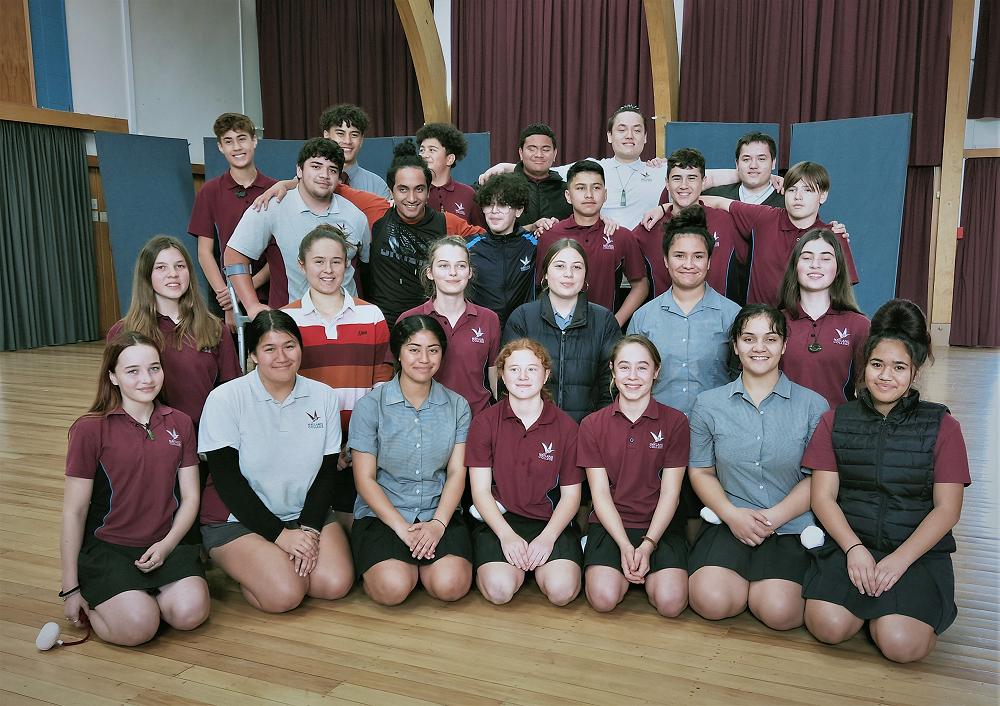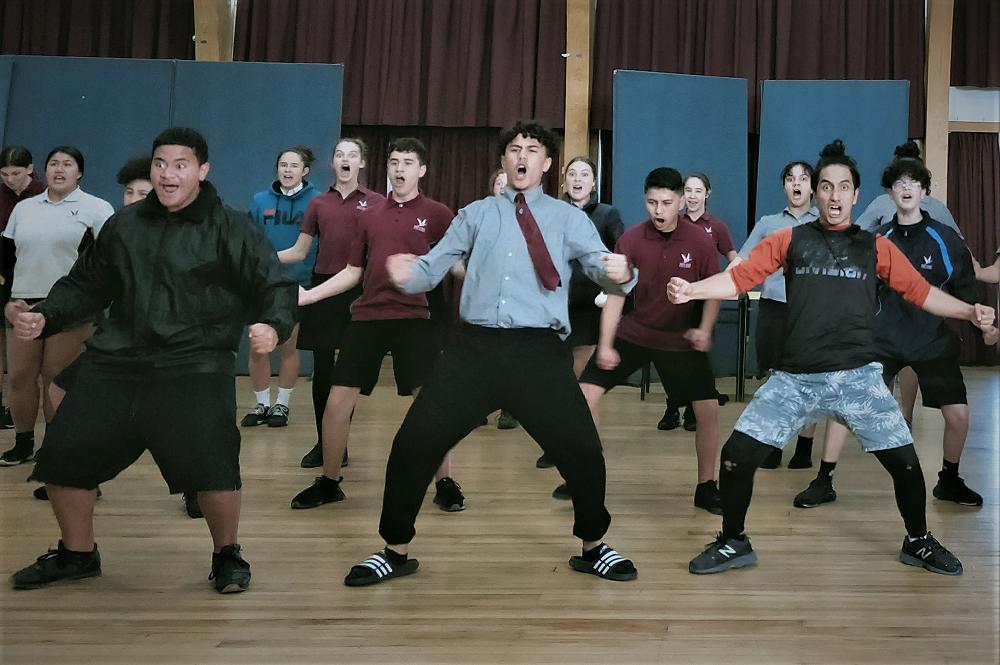
Pūaha Te Tai - Smash the waves!
A lot has been happening within the whānau class and Sarah Luton caught up with Head of Māori Studies Whaea Chanel Ngaruhe, Whānau Class Tutor Matua Nigel Lineham, Kapa Haka Tutor Te Haupai Davis, Nayland's Kaitaunaki Māori James Reneti, past student and current volunteer Joseph Meleisea and Year 10 student Astrid Sayer, to learn about their journey and their new name.
Head of Māori Studies Whaea Chanel Ngaruhe, arrived at Nayland College six years ago brimming with vision for what could be, for a small group of Māori students identified simply as 'the whānau class.'
"One of my visions for this whānau class was firstly to build the confidence and the knowledge of identity for these young leaders," she said. "Who are they? Where are they from? And let’s be proud to be Māori. No longer are we going to say 'Oh, I’m Māori' with our head down, we’re going to stand with pride, but in a humble way and say 'Yes I am Māori and I am proud to be Māori.'
Whaea Chanel's vision also included a desire to grow
tikanga (practices and protocol), reo (the language) and also Kapa
Haka. Over the past six years there has been steady growth in all three areas, resulting in a growth in numbers and participation as well. There are now four House Tutors supporting up to 70 students during tutor time, with up to 50 students regularly involved in Kapa Haka practices on Fridays.
To support this growth and her vision, Whaea Chanel brought in two new Kapa Haka tutors in Term 3 last year. Te Haupai and Estella Davis are a husband and wife team who are both studying to be social workers. "Te Haupai & Estella are a beautiful blessing. They are very strong in their identity, they’re strong in their Kapa Haka skills and expertise and they genuinely have a heart for this kaupapa (values & principles) like myself," Whaea Chanel commented.
In speaking with Te Haupai regarding the positive changes he has seen over the past year he said, "From dribs and drabs coming in to solid numbers every week I think there’s a major improvement in the way they hold themselves. The way that they conduct themselves during practice has improved a lot, they’re far more disciplined. I’ve been told and I’m aware that their attendance has picked up which is all positive things that we’re trying to push."
Bringing in two new Kapa Haka tutors wasn't the only change that Whaea Chanel initiated last year. In response to both growth in the rōpū (group) and an acknowledgement of the challenges students often face, she began a conversation with the whānau regarding changing their name. Three names were presented for discussion and the rōpū looked at the meaning and history behind the names, before casting their votes.
'Pūaha Te Tai' was one of the names that Whaea Chanel put forward as a suggestion. "I came up with that because of our environment, we’re close to the moana (ocean)," she said. "(Also) we have a lot of young people within the whānau itself who have a lot on their plate. In order for them to have hope and keep going, we need to let them know it’s ok to make mistakes, it’s ok, it’s going to be hard but you need to persevere and you need to smash that wave and never give up."
"It was just a really lovely, natural process," said Astrid Sayer, a Year 10 student and member of the whānau. "We were all in a really lovely way a part of it... There was Pūaha Te Tai, ‘smash the wave,’ ...you know as teenagers we have waves, like the tide coming in, like coming up against obstacles. But the idea is that you smash past the waves, you know like you’re on a boogie board and you smash over them. We voted and that was the one. That sort of I think resonated with a lot of us, that idea, that concept."
As a Year 13 student and this year's Kaitaunaki Māori, James Reneti has seen the rōpū overcome a number of challenges since he first joined. "The challenge of not having proper tutors for kapa haka, not having our own bracket (set of haka) that defines us... also our struggles with numbers. The wave symbolises us reaching for te rangi tūhāhā (the heavens), overcoming the obstacles that come our way," he said.
For Joseph Meleisea, a Year 13 student in 2019 who continues to volunteer and support the rōpū, he was initially unsure about the need for a name change.
"I felt like we didn’t need one (a name) at first, but looking back at it from outside of a student’s perspective and from now as I’ve finished school, it really does symbolise everything that we’ve probably gone through. From going from a non-existent kapa haka group to like 50-60 kids participating every week... that definitely symbolises rising above any obstacle that has come. We could have given up straight away but with Whaea Chanel leading and with us buying into that culture of not giving up, we were able to keep moving forward."
"I would say it’s given us an identity," added James. "It’s given us a proper name for ourselves. It’s given us a common goal to work towards because a lot of Māori students I know are quite lost in what they want to do. Kapa Haka in general gives them something they know and something solid that will be there for them. It also provides a release of stress. Once you go through the haka you’re burning all that raru (tension) and that sadness away and just basically creates a family."

The rōpū have certainly been on a significant journey over the past year. In speaking of what he has seen during his time as a whānau class tutor, Matua Nigel said, "The amazing thing is the growth and not just in numbers... but also the participation. Boys who refused to be involved and didn’t want to be involved just suddenly, absolutely giving it everything, it’s just brilliant."
Going forward, the teachers, tutors and students alike all share similar desires around continued growth and vision for the future. They hope that Pūaha Te Tai will continue to grow both in numbers and in strength, identity and belonging.
As an ex-student who continues to support the rōpū, Joseph is keen to see "a really strong nucleus develop within the whānau of kids wanting to grow and continuing to work towards the purpose that Whaea Chanel has set and that everyone has bought into over the last six years." He hopes to see more students stepping up before they have to say goodbye to the Year 13s. "Not goodbye as in they’re not part of the whānau, but just goodbye for their journey with Nayland has come to an end," he said.
Seeing young leaders want to come back and give of themselves is one of the major highlights and success factors for Whaea Chanel. "Not only has the numerical growth been a real positive for me but the fact that these young leaders want to come back and still give, that’s huge... All of these young leaders could become the next Kapa Haka leaders, I have faith in all of them."
Another major drive for Whaea Chanel going forward is to see Pūaha Te Tai get themselves ready for when Te Tau Ihu o Te Waka a Maui (The Top of the South) plan to host Te Matatini in 2025, as announced earlier this year. (https://www.teaomaori.news/nelsonwhakatu-plans-host-te-matatini-2025)
As such she claims to be very staunch in her expectations around compulsory attendance to Kapa Haka. "If we can’t get it right at this level and have a strength and a growth in participation at Kapa Haka then we’re going to find it hard to support such a huge event," she said. "It’s not just a nation thing, it’s a global thing and we want Te Tau Ihu to feel proud and to feel confident that they’ve got the next generation stepping up."
Te Haupai and Estella too are passionate about the importance of Kapa Haka and the purposes behind what Kapa Haka offers.
"For Estella and I, our purpose is to make sure that the next generation has some form of Te Ao Māori in our lives. Even though there are a lot of Māori students here, some of them don’t have Kapa Haka, don’t have waiata (songs), don’t have the knowledge of why we do these things, why we have these things in Te Ao Māori. By passing that on, they can take that knowledge on ...to their whānau, their cousins, their kids eventually and know that within the Kapa Haka realm and Te Ao Māori, that these things were for a purpose, they are there for therapeutic purposes so that we could heal ourselves. We passed our knowledge through these waiata, haka (and) moteatea (lament). We have tikanga within them and it’s how we lived our lives, how we expressed ourselves through frustration, through love (and) through sadness, so it’s a broad range of things that you can do through Kapa Haka."
The safe outlet for expressing emotions was something Astrid appreciated too. "Just that opportunity to unleash all those feelings that you’re not allowed to in every other part of society or of your day. Having a moment, you know if we want to cry, if we’re upset about something, we cry, if we want to yell and scream, we do that, you know if you want to be overjoyed that’s ok too... that opportunity to express ourselves in that way that’s so different and so unique."
In asking the students what they would say to others who might like to join Pūaha Te Tai, there was a resounding 'just do it' from all of them.
"School is too short to look back at it when you’re Year 13...and be like why did I not do that", said Joseph. "Just do it, we’re not going to look at you and look down on you, we’re going to help grow and cultivate you so that you can be a better person than you were when you came in."
"We even have students that have never done Kapa Haka before and they’re still catching up," added James. "Like what (Joseph) said, school’s too short to say ‘maybe’ or ‘some other time.’ It goes by too quick to procrastinate so just do it."
For those who might wonder whether they would be 'allowed' to join Pūaha Te Tai if they are not Māori, James and Joseph were both adamant that there is room for everyone.
"If you are willing, if you have the courage to step up and be a part
of it, if you’ve got a passion, if you’ve got a voice to say what you want to
say, (it's) just merely a matter of courage, taking the first step," said James.
Joseph agreed, "The family is never too big for anyone to join."
